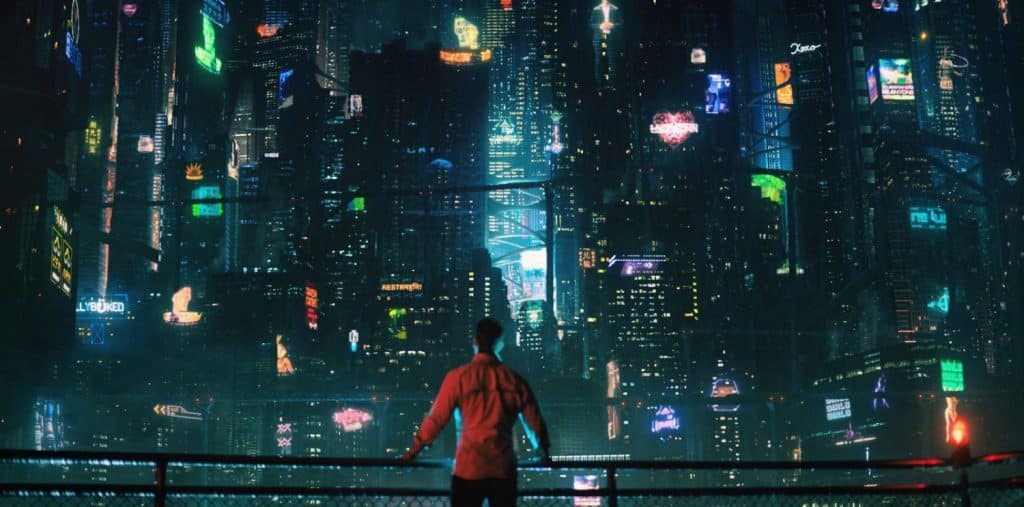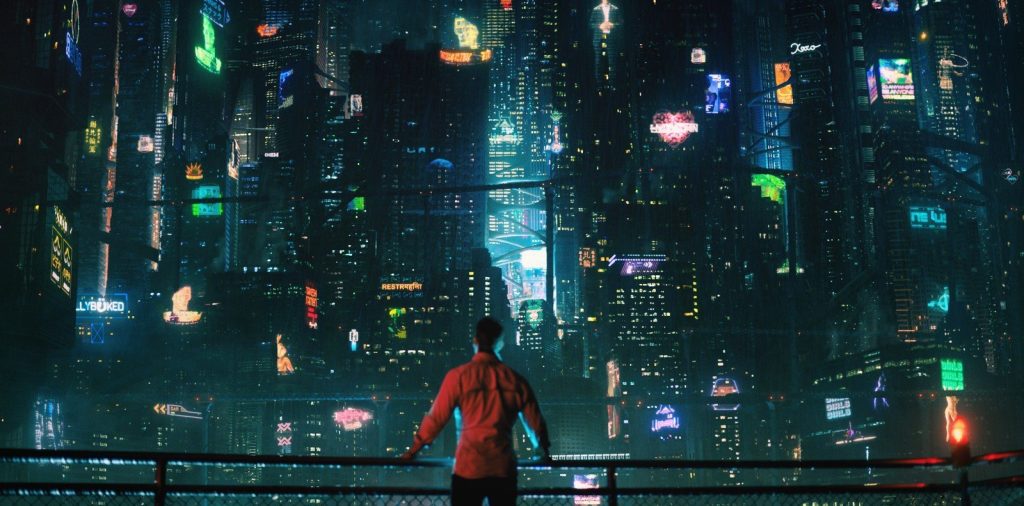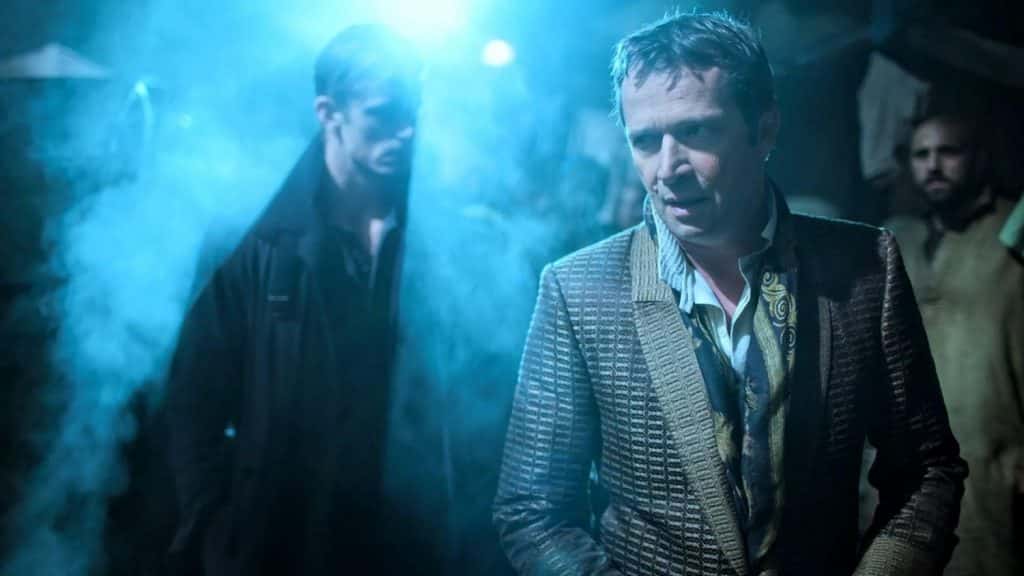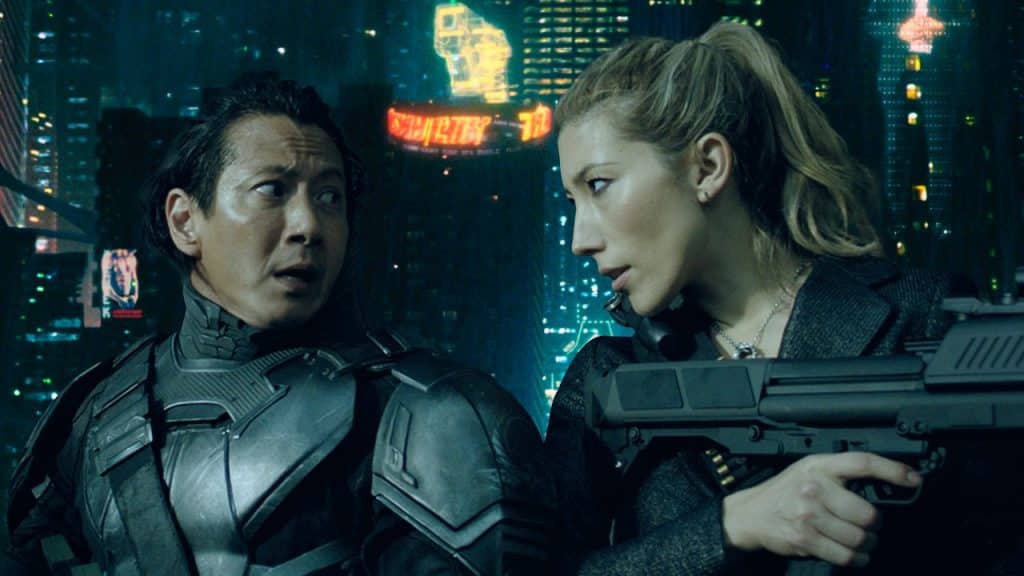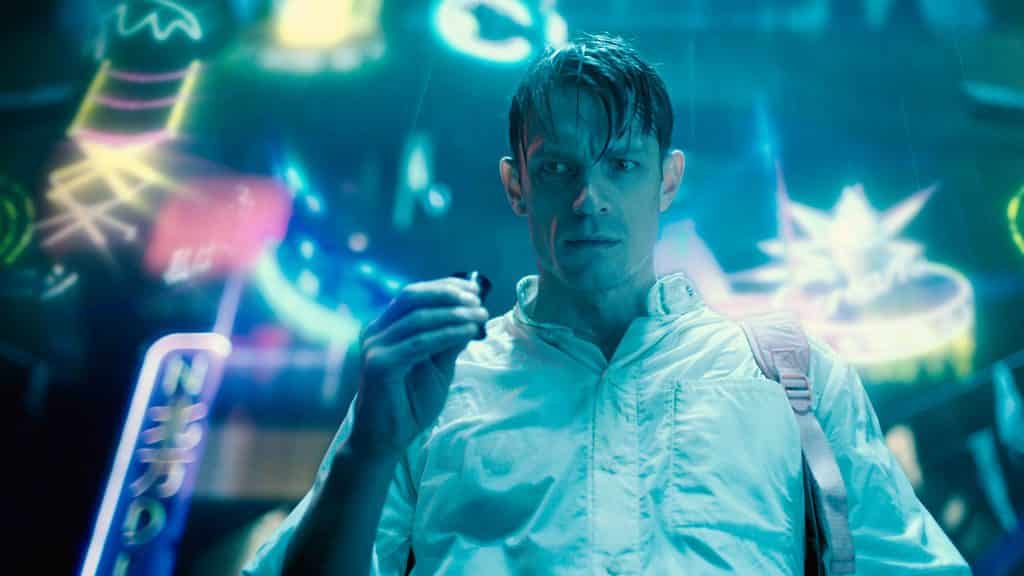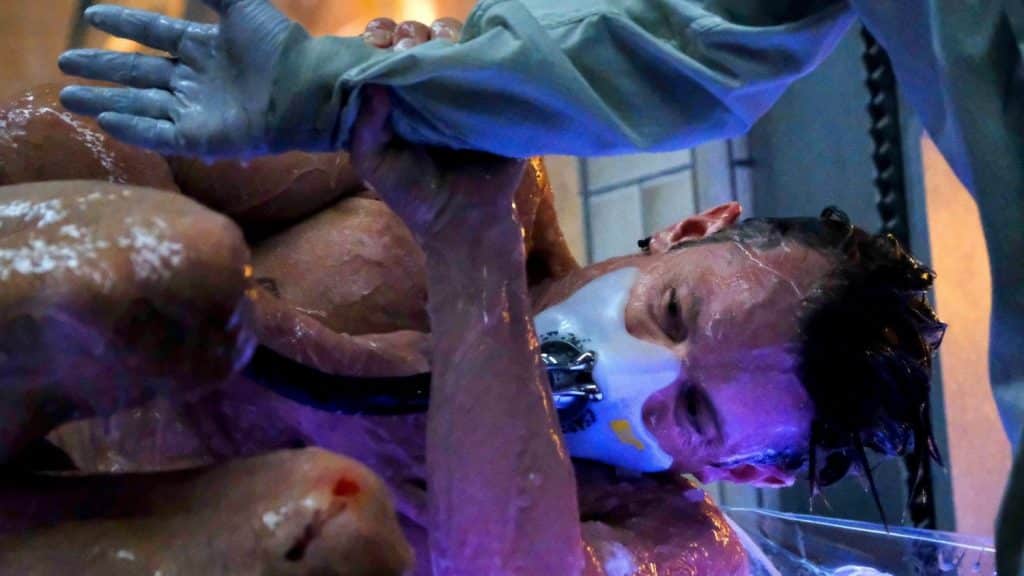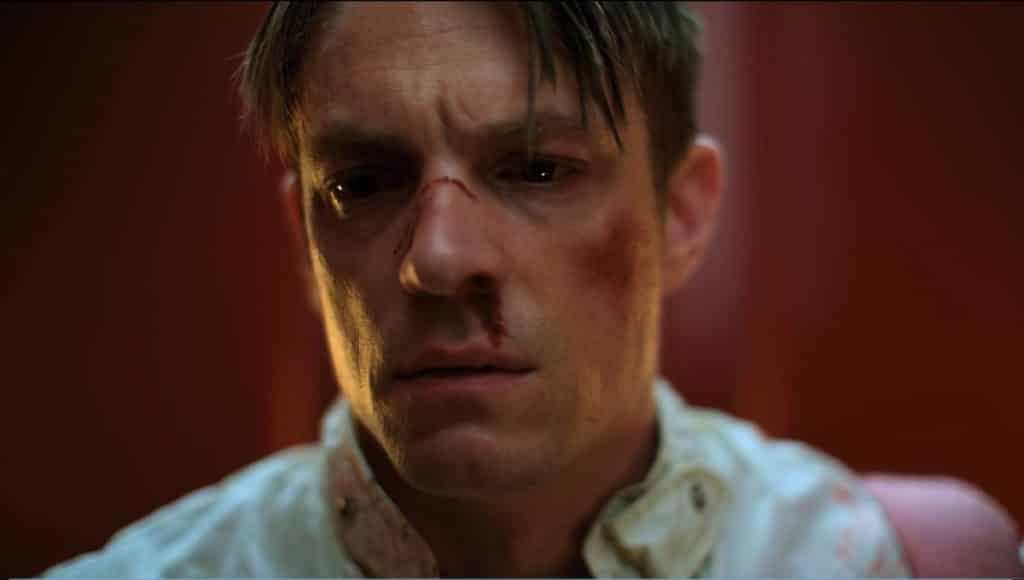Watching Altered Carbon, one inevitably asks, would life lose its savor if we lived forever?
In the Netflix series Altered Carbon, based on the Richard K. Morgan novel of the same name, humanity has spread amongst the stars discovering remnants of alien technology. One of the inventions as a result of contact with these alien technologies is the cortical stack.
A part of everyone from the age of one, it sits at the base of the skull and records the consciousness of each person, allowing them to survive bodily death as long as the stack remains intact. The use of the stack is ubiquitous, however there is ongoing debate over the ethics of bringing someone back to life, even in circumstances of identifying their murderer. At the forefront of this debate are the NeoCatholics, and everyone who identifies as Neo-C essentially has “Do Not Resuscitate” in their stack.
SPOILER WARNING: Massive spoilers ahead for Netflix’s Altered Carbon: Season 1 as well as the book series Altered Carbon.
The World of Altered Carbon
There is a stark difference between the “haves” and the “have nots” in the arena of immortality. In one scene, parents are shown receiving their daughter—a murder victim—in a new “sleeve,” which happens to be a haggard-looking woman in her forties. In outrage, they argue that she is a seven-year-old girl, and are brushed off because that’s the body in stock, and at least they have their daughter back.
Artificial intelligence, augmented reality, and virtual reality are all highly sophisticated and widely implemented in the world. Hotels are run by artificial intelligence programs, advertisements on the street are more likely to be part of augmented reality than actual displays, and a person’s stack can be spun up in virtual reality where they experience all the physical sensations of being in another place, exploitable for both pleasure and pain.
In Altered Carbon, the immensely wealthy can afford to have the information in their cortical stacks backed up outside of their bodies by using “needlecast” cloud storage. They grow clone bodies and ensure that there is no way for them to truly die. These individuals, many of them already hundreds of years old, are known colloquially as “Meths,” from Methuselah, the longest-lived person in the bible.
Altered Carbon’s Two Polarities: Takeshi Kovacs and Laurens Bancroft
One such Meth is Laurens Bancroft, a powerful businessman who has made no small part of his fortune as a result of humanity’s expansion beyond Earth. When he is found dead in his study, seemingly by his own hand—with a weapon only he and his wife’s biometrics could access—he sets out to discover who was sloppy enough to try and murder him. Because he has needlecast backups of his stack, he is only missing 48 hours of memories.
He pays to have the prisoner Takeshi Kovacs put into a new sleeve to investigate his murder. He chose Kovacs because of his background as an Envoy, someone who specializes in observing, absorbing, and integrating into their surroundings. Bancroft decides that if anyone has a chance of discovering the truth, it will be him.
Both of these men are headstrong, confident, and aware of their relative immortality. Both of them have experience dying and wearing new sleeves. Lastly, both of them show restraint, but for significantly different reasons.
Stark Contrasts of Character
Kovacs as an Envoy, is a master of body language and able to read the subtle signs that others display. There is a certain flatness to his interaction with people, at least on the surface, because he never wants to give away what is going on inside his head.
Bancroft is a man of passion, and he must keep himself on a tight leash in order to function in polite society.
Kovacs is a man who lost people he loves, including both his sister Rei and his Envoy trainer. He acknowledges that these losses affect him, but he does not allow them to interfere with his tasks at hand. He remains calm, even while withstanding virtual reality torture, and uses self-control techniques from his time as an Envoy to wake himself up. His confidence comes from the knowledge that he can control himself when he needs to.
This is not to say that Kovacs is an ascetic or a saint. He is not above the use of intoxicating substances. One of the first times we see him on his own after accepting the job of investigating Bancroft’s murder, he spends some of his employer’s money to purchase a unicorn backpack full of street drugs and he is wandering Bay City, succumbing to the overwhelming input of flashing advertisements in augmented reality. He does not rely only on these substances to escape from reality. He has no demons in want of confronting, and he does not need to run away from them.
The Story Until Now – Altered Carbon: Season 1
One of the first things Kovacs learns about Laurens Bancroft is that the man has a wide variety of appetites. He frequents both virtual and physical brothels. Kovacs does not immediately pass judgment on his employer, but as he follows the trail of evidence, he begins to peel back the layers of the man’s character and finds a disregard for human life, and self-aggrandizing arrogance.
Bancroft confronts Kovacs after finding out that the envoy had an affair with Miriam, his wife. He appears to hold conflicting views of fidelity, given his own extramarital activities. Kovacs, in confusion, asks if Laurens loves his wife “too much to f*** her.” He is met with the immediate response “I love her too much to let you f*** her.” This is the first hint we see that Laurens is aware of his own dark desires, and that Miriam is aware of them too.
Head in the Clouds
Bancroft uses his connections to block the legislation that would allow victims to be brought back to identify their murderers. He did so in collusion with the mistress of a high-end orbiting brothel “Head in the Clouds” catering to people with Bancroft’s fetishes. She has the prostitutes who work there re-coded as NeoCatholic without their knowledge so they cannot testify what happens to them, all while promising them new sleeves after their clients finish with them.
If Bancroft could ensure that no one could ever speak against him, he would forever have a safe place to indulge his fantasies, without hurting someone he loves, and without having to experience it in virtual reality alone.
Possessed of the impulse to kill his sexual conquests, Laurens finds other outlets for this passion, rather than subjecting his wife to them. She accepts that he will engage in affairs with other women, and they both acknowledge that it would be crossing a line for him to take the life of a sleeve Miriam was wearing, regardless of the fact that she could be brought back. It is one thing to love a killer, it is another to love your own killer.
And the Plot Turns
We find out that Miriam is fully aware of her husband’s proclivities when the evidence is brought against him. She knew he would be furious upon returning from his business trip, and she pointed him toward Head in the Clouds. Laurens is forced to acknowledge that he did the one thing he thought he would never do: try to destroy himself. He must confront the fact that he felt remorse for his actions, and he is not the man he thought himself to be.
Kovacs loses his sister a second time when he realizes that she was never dead and has in fact become a Meth herself, the proprietress of Head in the Clouds. Rei’s sense of morality and honor have been warped by the hundreds of years she has experienced, and the abuse she suffered at the hands of her would-be protectors when she and Takeshi were parted as children.
The Path Not Taken
Rei took a path that is alien to him; they both went through the Envoy training, but diverged in their perception of the world. Takeshi is no stranger to pain, and he has been a mercenary at times, but he never used the skills he learned as an Envoy to manipulate people to the extent Rei has.
Rei, at her core, believes that the people she exploits deserve it because they were foolish enough to follow their impulses rather than control them for personal gain. They have both seen the darker side of humanity in the lives and sleeves they have experienced. Takeshi, while not believing there is any absolute good, believes that people who are cruel for cruelty’s sake deserve punishment. Rei believes that everyone is cruel, and she may as well profit from it.
A Death that Matters
He realizes that the Rei he once knew really is dead, and the woman his sister has become is a victim of the same disillusionment in her immortality as Laurens Bancroft. He infects her needlecast with a virus that corrupts the data so that she has one life left, and no escape from Head in the Clouds.
After she confesses what she did in altering the religious coding of the prostitutes who work for her, he holds her while the satellite crashes. While he has no particular affinity for his sleeves, as they are merely tools to him, he values life, and he can no longer allow someone like Rei, or Bancroft, to go free.
Morality vs Immortality, What Living Forever Gets Us
The Meths in Altered Carbon live for so long that they lose what it really means to be human. With nothing but time and the assurance that they can buy their way out of the problems that plague the average person, Meths no longer find the same small joys that common people do. Sometimes the beauty of a thing is that it is ephemeral.
A rose will wilt and die, but it was beautiful for its time in bloom.
So, too, a human life is made beautiful by the accomplishments of a single lifetime. Detective Kristin Ortega helps Kovacs in his search for Bancroft’s killer, and in several scenes, we are shown that her family is NeoCatholic.
Better to Remember You By
Beyond the religious overtones, these are people who find satisfaction and happiness in the knowledge that they will one day leave this world behind, and the way people remember them after they are gone is important to them.
Without the need to add to a legacy, to leave a memory for others after one passes from the world, the Meths become selfish and myopic. They focus so closely on their own desires they ignore the rest of humanity.
They do not have to care about people like Kristin Ortega and her family, because what is eighty years, or even a hundred, when you have a veritable eternity stretching before you?
Accepting Death
The people who would shout you down and condemn your use of technology to extend your life will not matter if you can outlive them and change the way society approaches the ideas of life and death, which is exactly what they have already been working to do for hundreds of years.
Kovacs has never lost sight of the fact that it is possible for him to die, he does not approach life from a fatalistic or suicidal standpoint. He has no issue with wearing a new sleeve, but he does not keep clones and needlecasts as an insurance policy against ultimate death. He knows it will find him one day, and he is ready to accept it when it comes.
Ultimately, he holds the selfish motivations of Laurens and Rei against them. They both use their influence exclusively to their own betterment, and the direct detriment of people who trust them.
Science Fiction or Real Warning
As a society, we are far from the bleak future in Altered Carbon, but Elon Musk’s Neuralink may put us a step closer to its idea of relative immortality. The idea behind Neuralink, essentially, is that one day humans will be able to interface with technology directly.
We are already using technology as a staple of our everyday lives. Most people have a smartphone, a computer, and many people embrace the integration of technology as a fundamental part of their homes with either Google assistant or Alexa. Thermostats, lighting, security systems, doorbells and even the deadbolts to homes are under digital control.
Within Arms Length
If we are already using technology as a crutch, how far of a leap is it to make direct neural interface with these objects a reality? In a little over a decade, social media has already conditioned a large portion of the population to share intimate details with complete strangers, and to see the ubiquity of technology as the next best thing for humanity.
While cloning is far from the level it would need to be to put someone into a new physical body as shown in Altered Carbon, as robotic technology advances there is the potential that a human consciousness could be put into an artificial receptacle.
Do We Suffer If We Live Forever?
We have no way of knowing what it would do to the human psyche to come to the realization that they are a ghost in a machine, whether that machine is a server farm or a robotic body, but it would be the first step to achieving an immortality of consciousness.
If human consciousness interfaces with digital media in a seamless enough manner, it may be possible for people to live on digitally after the death of their physical bodies. In the event that humans began to exist as pure consciousness inside of digital media, there would then be ethical concerns over the handling of data.
What would be the punishment for not having adequate power backups for a server bank that contains thousands of minds in the event of an outage? How would the stealing of identity and credentials be handled when you have someone that does not exist as a physical entity, and their digital imprint is all they have?
In Conclusion, Until Season 2
We must face the possibility that if someone exists as a digital profile, there would be no escape from an ongoing deluge of hateful commentary. Online anonymity already laid the foundation for a toxic environment that has made people take their own lives.
There is no way to determine how much stress a person could endure from this kind of vitriol before they fragment into something no longer recognizable, unless they have the ability to block such things out.
This is a parallel to the privilege the Meths have in Altered Carbon. They have the resources to buy their way above common problems. There is no guarantee that even with a large sample size, people would become civilized in a digital setting, and there would always be someone looking to make a profit from the privilege of allowing people to separate from their fellow man.
Instead of Meths, there would be Big Data gurus cataloguing each person through the digital world, waiting to offer them the opportunity to escape for a price.
